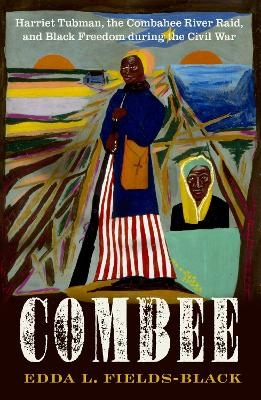
COMBEE
Oxford University Press Inc (Verlag)
978-0-19-755279-7 (ISBN)
The story of the Combahee River Raid, one of Harriet Tubman's most extraordinary accomplishments, based on original documents and written by a descendant of one of the participants.
Most Americans know of Harriet Tubman's legendary life: escaping enslavement in 1849, she led more than 60 others out of bondage via the Underground Railroad, gave instructions on getting to freedom to scores more, and went on to live a lifetime fighting for change. Yet the many biographies, children's books, and films about Tubman omit a crucial chapter: during the Civil War, hired by the Union Army, she ventured into the heart of slave territory--Beaufort, South Carolina--to live, work, and gather intelligence for a daring raid up the Combahee River to attack the major plantations of Rice Country, the breadbasket of the Confederacy.
Edda L. Fields-Black--herself a descendent of one of the participants in the raid--shows how Tubman commanded a ring of spies, scouts, and pilots and participated in military expeditions behind Confederate lines. On June 2, 1863, Tubman and her crew piloted two regiments of Black US Army soldiers, the Second South Carolina Volunteers, and their white commanders up coastal South Carolina's Combahee River in three gunboats. In a matter of hours, they torched eight rice plantations and liberated 730 people, people whose Lowcountry Creole language and culture Tubman could not even understand. Black men who had liberated themselves from bondage on South Carolina's Sea Island cotton plantations after the Battle of Port Royal in November 1861 enlisted in the Second South Carolina Volunteers and risked their lives in the effort.
Using previous unexamined documents, including Tubman's US Civil War Pension File, bills of sale, wills, marriage settlements, and estate papers from planters' families, Fields-Black brings to life intergenerational, extended enslaved families, neighbors, praise-house members, and sweethearts forced to work in South Carolina's deadly tidal rice swamps, sold, and separated during the antebellum period. When Tubman and the gunboats arrived and blew their steam whistles, many of those people clambered aboard, sailed to freedom, and were eventually reunited with their families. The able-bodied Black men freed in the Combahee River Raid enlisted in the Second South Carolina Volunteers and fought behind Confederate lines for the freedom of others still enslaved not just in South Carolina but Georgia and Florida.
After the war, many returned to the same rice plantations from which they had escaped, purchased land, married, and buried each other. These formerly enslaved peoples on the Sea Island indigo and cotton plantations, together with those in the semi-urban port cities of Charleston, Beaufort, and Savannah, and on rice plantations in the coastal plains, created the distinctly American Gullah Geechee dialect, culture, and identity--perhaps the most significant legacy of Harriet Tubman's Combahee River Raid.
Dr. Edda L. Fields-Black teaches history at Carnegie Mellon University and has written extensively about the history of West African rice farmers, including in such works as Deep Roots: Rice Farmers in West Africa and the African Diaspora. She was a co-editor of Rice: Global Networks and New Histories, which was selected as a Choice Outstanding Academic Title. Fields-Black has served as a consultant for the Smithsonian National Museum of African-American History and Culture's permanent exhibit, "Rice Fields of the Lowcountry." She is the executive producer and librettist of "Unburied, Unmourned, Unmarked: Requiem for Rice," a widely performed original contemporary classical work by celebrated composer John Wineglass. Fields-Black is a descendent of Africans enslaved on rice plantations in Colleton County, South Carolina; her great-great-great grandfather fought in the Combahee River Raid in June 1863. Her determination to illuminate the riches of the Gullah dialect, and to reclaim Gullah Geechee history and culture, has taken her to the rice fields of South Carolina and Georgia to those of Sierra Leone and Republic of Guinea in West Africa.
Prologue: The Voices We Have Not Heard
Part I: The Prison House of Bondage
Chapter 1: End of Importation
Chapter 2: The Oldest Old Heads
Chapter 3: An Economy in Transition
Chapter 4: "Play Children Together"
Chapter 5: Flight from Bondage
Chapter 6: Swamp Reclamation
Chapter 7: John Brown's Body
Part II: The Proving Ground of Freedom
Chapter 8: "Gunshoot at Bay Point"
Chapter 9: "More Intelligence than Anyone Else"
Chapter 10: Broken Promises
Chapter 11: Just the Two of Us
Chapter 12: "Ropes Around their Necks"
Part III: The Combahee River Raid
Chapter 13: "Make the Enemy Pay the Way"
Chapter 14: "I Was Gwine to the Boat"
Chapter 15: "Don't We Colored People Deserve Credit?"
Part IV: "We's Combee"
Chapter 16: Closing in on Charleston
Chapter 17: "Lay my Bones in dat air Bush"
Epilogue: Risking Everything for Black Freedom
| Erscheinungsdatum | 12.12.2022 |
|---|---|
| Zusatzinfo | 116 color plates and 3 maps |
| Verlagsort | New York |
| Sprache | englisch |
| Maße | 147 x 229 mm |
| Gewicht | 1361 g |
| Themenwelt | Geisteswissenschaften ► Geschichte ► Regional- / Ländergeschichte |
| Sozialwissenschaften ► Ethnologie | |
| Sozialwissenschaften ► Soziologie | |
| ISBN-10 | 0-19-755279-X / 019755279X |
| ISBN-13 | 978-0-19-755279-7 / 9780197552797 |
| Zustand | Neuware |
| Informationen gemäß Produktsicherheitsverordnung (GPSR) | |
| Haben Sie eine Frage zum Produkt? |
aus dem Bereich


